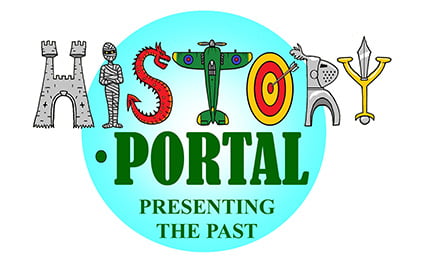It was a man called .
More interestingly it was 180 odd years ago in 1841 when a cabinet maker from Leicestershire, called Thomas Cook, launched the first travel package trip. Yes, a cabinet maker came up with the first one!
How did it all start?
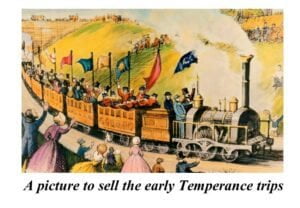
It all happened because he believed that alcohol was to blame for social problems, therefore when the Midland Counties Railway extended the line from Leicester to Loughborough, he organized a special train to carry temperance supporters to a teetotal rally in Loughborough. I wonder what his thoughts would have been if he had realised that his simple idea has led to all those booze trips? Not what he imagined I assume.
This trip took place on Monday 5 July 1841, taking 485 people, each paying one shilling for the return train journey, to a temperance rally.
Who was Thomas Cook?
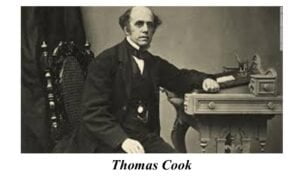 He was born on 22 November 1808 and was bought up at 9 Quick Close in the village of Melbourne, Derbyshire. His world was different from today, most people worked a long day, 6 days a week and never went more than 20 miles from home. For example, he started his working life at 10, as an assistant to a local market gardener on Lord Melbourne’s estate. When he was 20, he became a Baptist missionary touring local villages as an evangelist, distributing pamphlets, this led to him joining the temperance movement.
He was born on 22 November 1808 and was bought up at 9 Quick Close in the village of Melbourne, Derbyshire. His world was different from today, most people worked a long day, 6 days a week and never went more than 20 miles from home. For example, he started his working life at 10, as an assistant to a local market gardener on Lord Melbourne’s estate. When he was 20, he became a Baptist missionary touring local villages as an evangelist, distributing pamphlets, this led to him joining the temperance movement.
Thomas Cook became a travel agency.
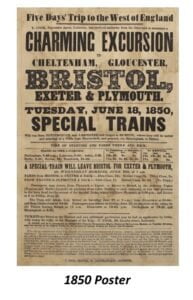 The success of this first trip led him to put together more and more railway trips for temperance societies and Sunday Schools. This led him in the summer of 1845, to turn his trips into a business and therefore planned his first commercial trip. The result was that on 4 August 1845 the first Thomas Cook commercial trip left Leicester for Liverpool. This was the start of a completely new industry that changed our world, allowing so many of us to go to so many exciting places.
The success of this first trip led him to put together more and more railway trips for temperance societies and Sunday Schools. This led him in the summer of 1845, to turn his trips into a business and therefore planned his first commercial trip. The result was that on 4 August 1845 the first Thomas Cook commercial trip left Leicester for Liverpool. This was the start of a completely new industry that changed our world, allowing so many of us to go to so many exciting places.
Over the years his business slowly grew, by the next year he took 350 people from his hometown, Leicester to Scotland. Over the following years he slowly grew, however, by 1851 he took as many as 150,000 people to the Great Exhibition in London. It took him a further four years before he put together his first international tour. This initial one took two groups on a ‘grand circular tour’ of Belgium, Germany and France, ending in Paris for the Exhibition. It was a popular exhibition that was aimed at showing off the diversity of products produced by French industry.
Thomas Cook & Son
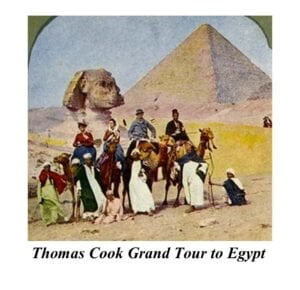 As the company grew, in 1865 Thomas Cook moved his offices to Fleet Street in London. There they expanded the business by using the office as a shop selling essential travel accessories, including guide books, luggage, telescopes and footwear. Then in 1872, he formed a partnership with his son, John Mason Andrew Cook, and renamed the travel agency as Thomas Cook & Son.
As the company grew, in 1865 Thomas Cook moved his offices to Fleet Street in London. There they expanded the business by using the office as a shop selling essential travel accessories, including guide books, luggage, telescopes and footwear. Then in 1872, he formed a partnership with his son, John Mason Andrew Cook, and renamed the travel agency as Thomas Cook & Son.
Unfortunately, the partnership wasn’t a happy one and it ended in the inevitable result of Thomas Cook’s early retirement at the end of 1878.
He moved back to Leicester and lived quietly until his death in 1892.
What was interesting is that in accordance with his beliefs, he and his wife ran a small temperance hotel above the London office. This led them to change their business model by introducing an ‘hotel coupon’ in 1868. These were detachable coupons in a counterfoil book valid for either a restaurant meal or an overnight hotel stay, provided they were on Cook’s list.
What else did we get from Thomas Cook?
One of his great achievements was that he made mass tourism popular to Italy.
He did this in some of what at the time were revolutionary ideas, such as:
- First, the circular tickets that could be used on almost all Italian railways. These tickets allowed travel by train for a predetermined number of days along prearranged routes.
- Second, Cook designed a series of hotel coupons to complement circular tickets, which could be exchanged for lodging and meals at designated accommodations.
- Last, he introduced the circular notes which could be changed at designated hotels, banks, and ticket agents for Italian lira at a predetermined exchange rate.
- Cook’s introduction of tourism-specific currency facilitated easier and effective trips within Italy.
The coupon system spread rapidly and was well accepted throughout Italian cities. Furthermore, thanks to this system, middle class Italians could afford to travel more frequently and more easily.
These coupons became what we called, traveller’s cheque, which I remember were still in use when in the 60’s my parents sent me to France. Today with credit cards we don’t need them, well, at least in Europe!
Thomas Cook was an amazing forward-looking man who changed the world of travel for ever.
Isn’t History fun?
10 questions to discuss:
- Beyond his temperance advocacy, were there any other personal motivations or experiences that influenced Thomas Cook’s interest in travel and tourism?
- How did the development of railway networks in the 19th century make Cook’s travel packages more feasible and appealing to the public?
- The blog mentions the challenges of his son John not wanting to continue the partnership. Do you think personal factors or differing business visions led to their strained relationship?
- Beyond Italy, were there any other specific destinations or types of travel experiences that Thomas Cook helped popularize?
- How did the concept of “circular tickets” and “hotel coupons” address travel concerns and logistics faced by tourists in the 19th century?
- What social and cultural impacts did Thomas Cook’s travel agency have on different countries and communities around the world?
- The blog mentions the decline of traveler’s cheques in the modern era. What other significant changes or disruptions has the travel industry seen since Thomas Cook’s time?
- Considering the initial temperance-related purpose of Cook’s first trip, how do you think the motivations and demographics of travelers have evolved over the years?
- What aspects of Thomas Cook’s business model or approach to travel do you think remain relevant or could be adapted to the modern tourism industry?
- If you could learn more about a specific aspect of Thomas Cook’s life or career, what would it be and why?
These questions are to encourage critical thinking and investigation beyond the basic facts presented here. Feel free to explore further based on your interests and the information available.
More about Thomas Cook:
https://www.reuters.com/article/uk-thomas-cook-grp-investment-history-fa-idUKKBN1W70OT
https://edition.cnn.com/travel/article/thomas-cook-history-timeline/index.html
https://www.storyofleicester.info/city-stories/thomas-cooks-leicester/
© Tony Dalton
